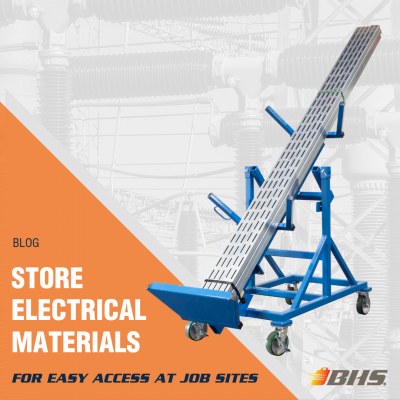We use cookies to make your experience better. To comply with the new e-Privacy directive, we need to ask for your consent to set the cookies. Learn more.
Store Electrical Materials for Easy Access at Job Sites

Where do you store electrical materials during a construction project? As just one contractor sharing space with all the other trades, electrical firms can quickly run into storage limitations. Add to that the challenge of sharing elevators, navigating narrow aisles, and the multiple trips usually required, and the scope of the material-handling challenge becomes apparent. You don’t want access to your own building materials to slow down the whole job.
So, rather than storing your materials in an on-site warehousing area, what can you do? You might try pre-assembling as much as possible at a company-owned warehouse, but even then, you may end up waiting on extra parts.
You might consider hiring an in-house warehouse provider, operated by your supplier. Of course, then you’re locked into a single supplier’s pricing. And there’s no guarantee that the supplier’s plot of on-site land will be any more accessible than your own.
Clearly, what electricians need is a way to limit their on-site storage requirements as much as possible without risking a shortage. One way to do that, then, is to use high-capacity electrical material carts. When you’re carrying supplies directly to the installation point, you don’t have to find space for storage. Even better — you’ll cut down on material handling time considerably.
The Cost of Material Handling Delays at Electrical Installations
Material handling can be a significant efficiency issue for construction electricians.
One early study, commissioned by the Foundation for Electrical Construction, Inc. (Electri International), found that electrical contractors spend up to 40 percent of their on-site time handling electrical materials. If most of that time could be diverted to actually completing the installation, then, contractors could provide a job turnaround 30 or even 35 percent faster than their competitors.
Material carts designed for electrical products make material handling much more efficient. Instead of sending employees halfway across the space to grab a few more light fixtures, you can load up the shift’s requirements in the morning and work steadily through the day. That’s a great way to improve productivity.
Solving the Storage Problem at Construction Sites
By their nature, construction sites change constantly. While the basement may be a great place to store extra light fixtures one day, the next, you might have to move the entire stock to an upper floor.
Mobile storage carts allow users to move their stock quickly. Besides, when you carry a day’s worth of light fixtures through the aisles with you, installing them in place one by one, you have fewer to store in a designated warehousing area.
So what kinds of electrical material handling carts can help with the storage challenge for electricians? Light Fixture Carts, Wire Coil Carts, and Conduit Carrier Carts are good places to start. If you’re working in a space with narrow aisles or tight elevators, consider using a Tilting Elevator Conduit Cart, which adjusts to fit into small spaces.
With an adequate selection of high-capacity material carts built for the electrical industry, construction electricians can limit their storage requirements while eliminating time wasted on retrieval.
References:
Casey, Susan. “On-Site Warehouses.” ECMag. Electrical Contractor Magazine, Apr. 2007. Web. 29 Jun. 2019.
